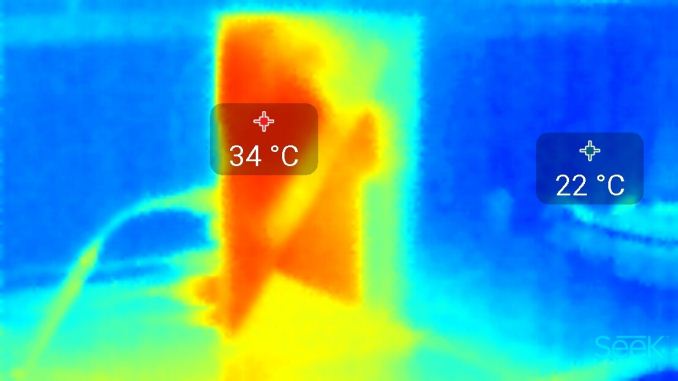The NVIDIA SHIELD Android TV Review: A Premium 4K Set Top Box
by Ganesh T S on May 28, 2015 3:00 PM EST- Posted in
- Media Streamer
- Home Theater
- TV
- 4K
- Shield
- NVIDIA
Power Consumption and Thermal Performance
In order to see what the power and thermal characteristics of the SHIELD Android TV are like, the device was tested in two scenarions:
- 1080p60 HDMI output to Pioneer VSX-32, connected to a Sony KDL46EX720 46" 1080p TV. Connected to a wired network, with a Samsung T1 SSD hanging off the USB 3.0 port
- 4Kp60 HDMI output to a Samsung HU6950 40" 4K TV. Connected to a wireless network, with a Samsung T1 SSD hanging off the USB 3.0 port.
The table below summarizes the important power consumption numbers.
| NVIDIA SHIELD Android TV Power Consumption | |
| Activity | Avg. Power (W) |
| Idle (Scenario 1) | 3.6 W |
| 1080p Netflix Streaming (Scenario 1) | 4.6 W |
| 1080p YouTube Streaming (Scenario 1) | 4.7 W |
| Kodi Playback (Hardware Accelerated 1080p60 H.264) (Scenario 1) | 6.5 W |
| Kodi Playback (Software Decoding 1080i60 VC-1) (Scenario 1) | 10.4 W |
| Idle (Scenario 2) | 4.2 W |
| 4K HEVC Playback (Scenario 2) | 9.1 W |
| 4K Netflix Streaming (Scenario 2) | 10.3 W |
| Gaming (Scenario 2) | 19.4 W |
Since the gaming scenarios stressed the at-wall power consumption heavily, we decided to run the GFXBench battery life test which puts the T-Rex benchmark in an infinite loop. After 2 hours, we took a thermal image of the unit (oriented vertically with the SHIELD stand).
The thermal solution is excellent, and the frame rates were consistent across all the benchmark runs. Thanks to the low-power SoC, the chassis temperature was just 34 C (ambient at 23 C). The fan noise was audible only when we kept our ears against the vents in the back panel.
Moving on to the business end of the review, we split up the positives and negatives into two sections - one for Android TV itself, and the other for the SHIELD.











167 Comments
View All Comments
nandnandnand - Thursday, May 28, 2015 - link
What is 24p? 24-bit audio?piroroadkill - Thursday, May 28, 2015 - link
I'm pretty sure he's referring to native 24 Hz output, or more than likely, 23.976, as most content (such as the video on Blu-ray discs) is encoded at 23.976.hifiaudio2 - Thursday, May 28, 2015 - link
Really too bad about no lossless audio codec support. Maybe a codec licensing pack add on for $20 or something?SleepModezZ - Thursday, May 28, 2015 - link
They say it supports FLAC. It is lossless and should support different sampling rates and bit rates. It is free. Maybe Ganesh refers to some other proprietary format that SHIELD TV is lacking?ganeshts - Thursday, May 28, 2015 - link
I was referring to lossless HD audio - like the type of tracks in BD-Audio discs or even certain Blu-ray soundtracks. - DTS-HD MA and TrueHD - [ http://forum.blu-ray.com/showthread.php?t=91776 ]SleepModezZ - Thursday, May 28, 2015 - link
Thank you. Are those codecs widely used outside of Blu-ray discs? As the SHIELD is not a Blu-ray player, those codecs are only important if they are used in streaming services. Unfortunately I don't know what Netflix or other services uses.ganeshts - Thursday, May 28, 2015 - link
I believe using the SHIELD as a player for the Blu-ray rips on a NAS will be a common use-case.SleepModezZ - Thursday, May 28, 2015 - link
Ok. Then the question is, is it possible to transcode DTS-HD soundtracks to multichannel FLAC streams while ripping the Blu-ray disc, and if, what do you lose in the conversion? FLAC (and HDMI) can handle up till 8 channels high res audio. Is there some problem with the AV receiver understanding such streams? If not, it would be recommended to rip Blu-ray discs into a format that SHIELD TV can play back. Re-encoding old rips should not be too difficult - just takes some time and electricity.ganeshts - Thursday, May 28, 2015 - link
AFAIK, there is no open source DTS-HD MA decoder.In any case, the easiest ripping scheme is to extract tracks without any transcoding. If the end-player can't support the resulting rip, then it is not something ideal - After all, there are probably other players which do support it.
In the case of the SHIELD, the only thing unique about it from a video playback perspective is support for 4Kp60 HEVC decode and HDMI 2.0 / HDCP 2.2 for 4K Netflix. If either of those are important to you right away, then you will be very happy with the SHIELD Android TV. If they are not urgent requirements - the only aspect preventing me from whole-heartedly recommending the SHIELD Android TV is that it is a closed embedded platform unlike a PC. We need something open and extensible like a HTPC that will also have full HEVC decode and HDMI 2.0 / HDCP 2.2
SleepModezZ - Thursday, May 28, 2015 - link
Thank you for your patience. It seems you are right - there is only commercial software for decoding dts-hd, so a free program like Handbrake can only pass-through the soundtrack, and then SHIELD can't play it.